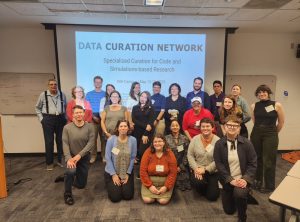Jun
27

Posted by NNLM Region 7 on June 27th, 2025
Posted in: Blog
Tags: Data, data curation
 I attended the “Specialized Curation for Code and Simulations-based Research” workshop that is hosted by the Data Curation Network. This workshop took place in May 2025 on the campus of the National Institutes of Health (NIH) for two days.
I attended the “Specialized Curation for Code and Simulations-based Research” workshop that is hosted by the Data Curation Network. This workshop took place in May 2025 on the campus of the National Institutes of Health (NIH) for two days.
The use of simulation-based research can be applied to plenty of disciplines, such as health sciences. Using this tool, real-life scenarios can be replicated to advance the sciences and personalized medicine. Simulations allow researchers to use real-world phenomena to predict what will happen based on reality. These simulation models are based on code. As data librarians and data curators, we play a key role in this kind of research when curating code, promoting practices to address problems when curating code, clear documentation of steps taken throughout research projects to encourage reproducibility, and communicating with researchers.
Practices with coding can be fragile since operating systems evolve and old systems will stop running after a few years. Software is a living artifact and is ever-changing. There are many kinds of coding languages and code can be ported, but it is not an easy process. During the workshop, we had an overview of containers. Containers can bundle code and keep it static, while allowing users to add layers to the code they are working on.
This workshop gave me experience in working in an integrated development environment IDE) alongside my colleagues while we all worked on projects in real time. An IDE assists with developing code efficiently and has multiple tools available in a single workspace. We also tackled other skills necessary in this work. This includes the idea of who your audience is when writing code, taking time away from your work and coming back to reflect on what we should be documenting, licensing knowledge, the use of Shiny Applications, how archived data should be complimented with code, digital twin technology, and so many other skills and resources that are current or emerging in the field.
One of the ways we can encourage reproducibility in research data is through README files. Cornell University has a guide on creating a README file that is often referred to in Data Curation Network workshops. You can find more information and a template here.
The Data Curation Network aims to make data more ethical, reusable, and understandable, while assisting researchers in publishing quality data. The network provides plenty of training and professional development, which you can learn more about on their website and through their monthly newsletter.
Attending workshops gives data librarians and data curators the opportunity to keep up with current technology and skills to bring back to our institutions, while allowing us to build community in our profession and learn from our peers. I want to thank the Data Curation Network for providing me with the opportunity to attend this workshop in person and to everyone that attended and aided in this thoughtful learning experience.